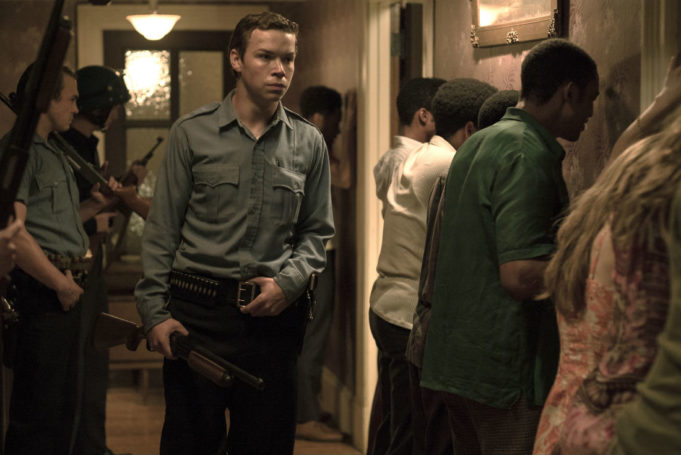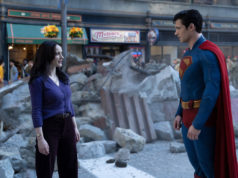Kathryn Bigelow ran into trouble during her last film, Zero Dark Thirty, as critics like me felt like it advocated the usefulness of torture, wittingly or not. Among other things, her latest film Detroit (which expands to Tarrant County this week) feels like an answer to that. By dramatizing an infamous incident of police brutality that happened 50 years ago, she has made a film that no reasonable person could claim to be pro-torture. That’s good, but in doing so, she has introduced other complications into what is an undeniably powerful work.
The film tells the story of the events at the Algiers Motel in July 1967, when the city of Detroit flared up in rioting between African-American civilians and a mostly white police force. The motel was supposed to be removed from the strife, but when a party guest there jokingly (and stupidly) fired a starter’s pistol, armed officers from the National Guard, Michigan State Police, and Detroit Police Department strafed the building with gunfire and stormed it. It was the city cops who then proceeded to terrorize the people inside for several hours, torturing them and killing three in an ultimately fruitless attempt to find a weapon. Though Bigelow and her fellow-traveling writer Mark Boal interviewed witnesses on the scene who were still alive, some of the film is taken from The Algiers Motel Incident, John Hersey’s book published in the wake of the killings.
Uncharacteristically, Bigelow starts this movie with an animated prelude illustrating Detroit’s racial history, drawn in the style of midcentury black modernist painters like Stuart Davis and Ernie Barnes. From there, she settles into a familiar groove as she depicts the chaos in the streets (one of Bigelow’s great strengths) in the days before, as white cops act like bullies in busting an unlicensed nightclub, only to be besieged in turn as they lead the arrestees outside the building into an angry neighborhood that throws bottles and rocks at them. The violence and decades of racial resentment build in the next few days, and even when newly elected Rep. John Conyers (Laz Alonso) goes out with a bullhorn and begs people not to burn down their own neighborhood, his pleas only further incite the crowd.
Could Bigelow have distilled this 143-minute film’s power further by concentrating on the events in the motel? Perhaps, but I found myself grateful for the context. In any event, this part of the film yields its most indelible image, as a singing group called The Dramatics is preparing for a career-making performance at the Fox Theatre when the rioting cuts the evening short before they can go onstage. The group’s crestfallen lead singer Larry Cleveland Reed (Algee Smith) takes the microphone and sings achingly in a lemon-and-honey tenor to an empty auditorium.
The lion’s share of the film does take place at that motel, as the unlucky Larry finds his way there to drown his sorrows and try to get his teenage buddy Fred (Jacob Latimore) laid. This part of the film works best as a ruthless examination of the psychology of torture, not just of its victims but also of its perpetrators and bystanders. Frustrated at their inability to find any evidence of a crime, the cops focus so single-mindedly on breaking people down that they brush aside everything that points to the motel guests being just guests. Scarcely less culpable is Melvin Dismukes (John Boyega), a black security guard at a store across the street who tries to act as a buffer in the situation and only succeeds in abetting the crimes. The cops beat the crap out of one man named Robert Greene (Anthony Mackie), and when they then discover that he’s a decorated Vietnam veteran, they immediately conclude that his Army record is fake. The two white women (Hannah Murray and Kaitlyn Dever) at the party get singled out for abuse, too, as the officers obsess over their sexual predilections. Then they start taking black men one by one into rooms and pretending to shoot them, until it’s the turn of one of the officers who didn’t get the memo that they’re only pretending. After that, the movie coldly exposes how police cover their asses in these instances — even though honest detectives and the guilty cops’ own boss manage to get them charged, a union lawyer (John Krasinski, playing sleazy for once, and to good effect) manages to sow enough doubts for an all-white jury to acquit. Watching the killers do their deeds and get off the hook isn’t fun, but it is illuminating in Bigelow’s telling.
Bigelow’s treatment of all this is typically remorseless; there may be filmmakers who do slowly unfolding violence as well as her, but no one does it better. I’ve heard some observers float the idea that Bigelow is using the medium of film to put us in the position of a bystander like Dismukes, who watches a great wrong happen while being powerless to stop it. This approach has its value, but it also has limitations. What does it say that the most vivid character in all of this is the worst of the cops (Will Poulter, born to play awful people)? Bigelow’s treatment threatens to reduce the black hostages — and yes, the white ones, too — to faceless victims. Granted, I can think of some African-American directors who might have handled this as unsubtly, but the fact is, none of them did. All this suffering requires an equally great catharsis, whether that’s the fantasy violence of Django Unchained or the bittersweet reunion of 12 Years a Slave or the outpouring of grief of Fruitvale Station. This film gives us Larry leaving The Dramatics and joining a church choir, which may be true to life, but it isn’t nearly enough of a healing moment to balance out what’s come before.
Of course, this film will continue to be timely as long as law enforcement officers continue to kill unarmed black men and get away with it. We’ve seen this drama enacted over and over again in Chicago, in Baltimore, in Minneapolis, in Miami, in Cincinnati, in New York, in Ferguson, Mo., and countless other places, and it’s all because our justice system does not hold the perpetrators accountable, and because a significant portion of us is fine with black men getting killed in streets far away from us as long as it makes us feel safer in our beds. Detroit may be a form of justice for the people who suffered through that night at the Algiers Motel, but you know what they say about justice delayed.
Detroit
Starring John Boyega and Algee Smith. Directed by Kathryn Bigelow. Written by Mark Boal. Rated R.












